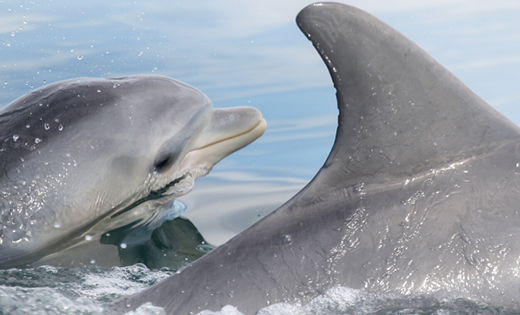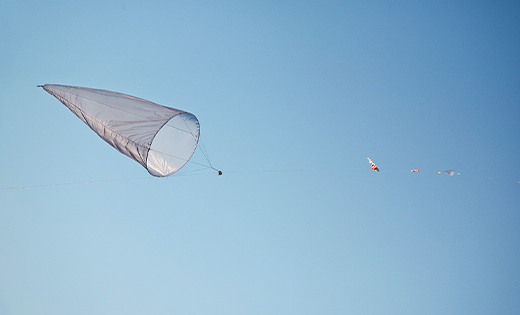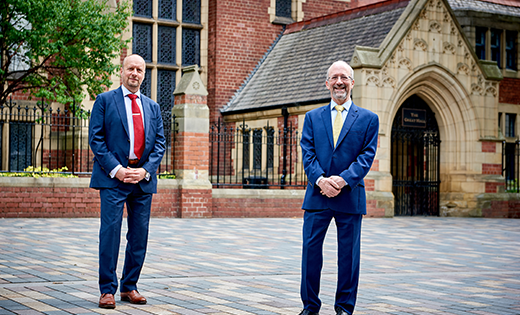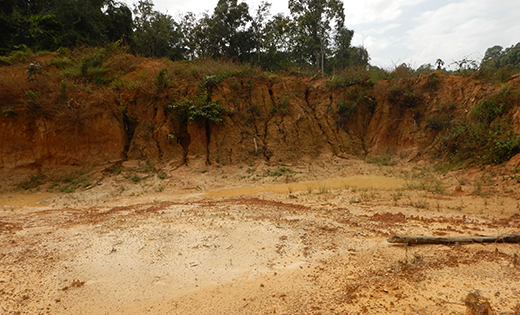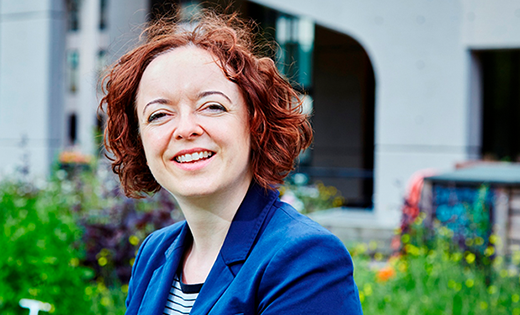Research Round-up – June 2020
Welcome to the latest instalment of our monthly feature series throwing the spotlight on our research success stories.
A new study demonstrates for the first time that dolphins can learn foraging techniques outside the mother-calf bond

The strength of our research is in making a real and telling difference to the world around us, by working across traditional boundaries to find innovative solutions to some of the greatest challenges facing society today.
Here we highlight some of latest projects being pioneered by the expertise and efforts of the highly talented research community at Leeds.
From grant awards to examples of outstanding interdisciplinary work and best practice, we’re keen to showcase your research achievements. See the foot of this article for details of how you can get involved.
Featured in this month's round-up:
- Shelling out for dinner – how dolphins learn foraging skills from peers
- Examining how entrepreneurial firms are responding to the covid-19 crisis
- DARE Art Prize winner to explore climate change
- Leaders appointed for new cancer research centre
- Exploring how covid-19 changed the face of crime
- Developing the UK’s first high-speed, high-resolution imaging facility
- Gold mining restricts Amazon forest recovery
- Space weather monitoring boost
- Investigating benefits support in covid-19 crisis
- New research and innovation podcast launches
- Helping to build resilient healthcare systems in post-covid-19 Africa
- How to feature in future research round-ups
Caption: New research reveals dolphins have a similar cultural nature to great apes
Shelling out for dinner – how dolphins learn foraging skills from peers
A new study demonstrates for the first time that dolphins can learn foraging techniques outside the mother-calf bond – showing they have a similar cultural nature to great apes.
The dolphins of Shark Bay in Western Australia are well known to scientists and have been closely studied for more than 35 years.
The first instances of an extraordinary new foraging technique called “shelling” were recorded by the team in the mid-1990s.
Shelling is a tactic used by dolphins when prey hides inside large empty shells of giant sea snails found in Shark Bay. They use their beaks to bring these shells to the surface and then shake the trapped food into their mouths – like the last few crisps at the bottom of a packet!
Foraging techniques in Shark Bay are typically passed on from dolphin mothers to their offspring – what researchers refer to as vertical social transmission. This transmission between generations was considered the only way dolphins learned foraging methods.
But the new study demonstrates that some of Shark Bay’s dolphins have learned this foraging method outside the mother-calf bond.
It suggests they observed their close associates shelling and then adopted the technique themselves – what researchers refer to as horizontal social transmission, which can occur within generations.
The study was led by Dr Sonja Wild, who conducted the research as a PhD candidate in the Faculty of Biological Sciences and is now a postdoctoral researcher based at the Centre for the Advanced Study of Collective Behaviour at the University of Konstanz.
She said: “These results were quite surprising, as dolphins tend to be conservative, with calves following a ‘do-as-mother-does’ strategy for learning foraging behaviours.
“However, our results show that dolphins are definitely capable, and in the case of shelling, also motivated to learn new foraging tactics outside the mother-calf bond. This opens the door to a new understanding of how dolphins may be able to behaviourally adapt to changing environments, as learning from one’s peers allows for a rapid spread of novel behaviour across populations.”
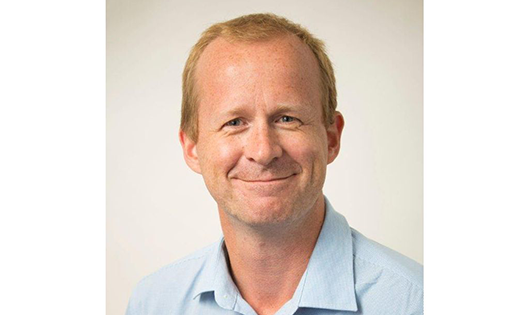 Caption: Professor Nick Williams has received funding to examine firms’ response to Covid-19
Caption: Professor Nick Williams has received funding to examine firms’ response to Covid-19
Examining how entrepreneurial firms are responding to the Covid-19 crisis
Funding has been secured to track the experiences and tactics of entrepreneurs in recovering from the Covid-19 crisis.
Professor of Entrepreneurship, Nick Williams, has received part of a £290,000 grant funded by the Economic and Social Research Council (ESRC).
The project – part of UK Research and Innovation’s rapid response to Covid-19 – is a collaborative effort from academics at Leeds, Edinburgh, Cranfield, Cardiff, Lancaster and Stirling.
Interviews with entrepreneurs during the next 18 months, will form the basis of this research. The project will tap into relevant networks via the likes of Entrepreneurial Scotland and the ScaleUp Institute, as well partners within the Leeds City Region. An online hub with advice and guidance for entrepreneurs on crisis management and resilience strategies is being created, with blog posts and infographics based on research findings to illustrate best practices.
Professor Williams said: "We are delighted to have been awarded this grant to obtain valuable insights to undertake important research on entrepreneurship and Covid-19.
“It is vital for the future of the economy that we understand the responses of entrepreneurs to the crisis and how they can emerge from it, and this will provide lessons on how future crises may be tackled more successfully. We look forward to working with our partners across the UK on this project."
Caption: Professor Redell Olsen will produce a song cycle and film in collaboration with Leeds researchers from the BioDAR research project
DARE Art Prize winner to explore climate change
Poet, writer and visual artist Redell Olsen is the winner of the £15,000 DARE Art Prize 2020-21.
The award offers an artist the opportunity to produce new work in partnership with scientists at Leeds, as well as staff and performers from Opera North, with residencies available at the National Science and Media Museum in Bradford and The Tetley – Leeds’ centre for contemporary art.
Professor Olsen will produce a song cycle and film in collaboration with Leeds researchers from the BioDAR project, which uses radar to collect information about insect biodiversity.
The work will not simply be an artistic response to scientific data, but also a contribution to the research itself, with the pieces created exploring alternative ways to represent climate change and the potential for species extinction.
Dr Christopher Hassall is from the School of Biology and leads the BioDAR project. He said: “We are delighted to have an artist collaborating with the BioDAR project.
“The research project is already interdisciplinary, combining the unique and complementary contributions of atmospheric scientists, ecologists and data scientists.
“However, a major challenge for us is how to present complex information in a way that is engaging and informative for technical and general audiences.
“Redell’s perspective on the work will not only add a novel way for us to communicate the project outputs but will also challenge us to think about how we work together as a wider interdisciplinary team.”
Caption: Professor David Sebag-Montefiore and Professor John Ladbury have been appointed to lead new cancer research centre
Leaders appointed for new cancer research centre
Key appointments have been announced following the launch of a major new interdisciplinary research centre that aims to put Leeds at the forefront of global efforts to tackle cancer.
Leeds Cancer Research Centre (LCRC) is a partnership between the University and Leeds Teaching Hospitals NHS Trust. It will bring together outstanding scientists and clinicians across discipline boundaries to deliver world-leading cancer research that ultimately improves patient outcomes.
It is yet another example of the excellent interdisciplinary research being undertaken at Leeds.
And two internationally acclaimed researchers have been appointed to lead the centre.
The Clinical Director is Professor David Sebag-Montefiore, a clinical oncologist who has led trials that have revolutionised the treatment of anal and rectal cancers using radiotherapy. He directs the Leeds Cancer Research UK Centre of Excellence for Radiotherapy Research, and was awarded the prestigious Gold Medal by the Royal College of Radiologists in 2019 in recognition of his outstanding international contribution to clinical oncology.
Professor Sebag-Montefiore said: “I am passionate about bringing together the best minds from traditionally distinct disciplines to solve the big research questions that will improve the lives of cancer patients. This simple and powerful objective is at the heart of what the new research centre will do.
“We will create new opportunities for collaboration between the laboratory and clinic, and foster a vibrant interdisciplinary community that pushes the boundaries of cancer research.”
The Scientific Director is Professor John Ladbury, whose ground-breaking research has shown how disruption to the signalling system within a cell can trigger cancer. He has worked at some of the world’s most prestigious cancer research institutions and was previously Executive Dean of the Faculty of Biological Sciences at Leeds.
He said: “I am excited by the opportunity to bring researchers together at the biological, clinical and physical sciences interface, and harness new innovative approaches to accelerate and translate scientific discoveries to the clinic.
“Through active research partnerships with the trust, leading institutions, industry and funders, Leeds will generate world-leading research that will shape better patient outcomes.”
Sir Alan Langlands, Vice-Chancellor at Leeds, said: “Cancer research is at the heart of the University’s strategy and we are fully committed to high standards in cancer care and the science that underpins it.
“The LCRC provides an excellent platform to link the laboratory to the clinic, enabling convergence of our significant strengths in structural biology, clinical research, physical sciences and engineering to address one of medicine’s toughest challenges.
“Professors David Sebag-Montefiore and John Ladbury are excellent appointments, with proven track records of internationally-renowned research and collaboration. Their combined leadership will ensure that Leeds is at the forefront of the international effort to fight cancer.”
Caption: Funding has been granted to look at how the pandemic has changed crime
Exploring how covid-19 changed the face of crime
The impact of covid-19 on crime in England will be interrogated by Leeds academics, thanks to a £666,000 grant.
A team of six researchers from Leeds and University College London (UCL) were successfully awarded the funding from UK Research and Innovation (UKRI), following a call for projects looking at the implications of covid-19 policies on wider society.
The 18-month project, led by Professor of Crime Science, Graham Farrell, will work with the Metropolitan Police, as well as Durham and Lancashire constabularies, to collate information and data about the levels and types of crimes following the outbreak of coronavirus.
Professor Farrell said: “The pandemic has changed the face of crime.
“Some crimes, such as shoplifting, decreased due to shop closures, and burglary due to increased guardianship as people stayed home.
“However, there is some evidence that crimes including domestic violence and various types of fraud have increased. Online crime opportunities have increased with more people working remotely and with increased online leisure activities.”
He added: “We will also try to anticipate the effects of various possible scenarios as lockdown is rolled back, hoping to increase the chances of maintaining any gains in reduced crime and trying to avoid offenders ‘making up for lost crime’.”
Researchers will work with a national advisory group from the Home Office, The College of Policing and the National Police Chiefs’ Council, and draw on expertise from around the world through an international advisory group of scholars from Australia, the Netherlands and the USA.
The team of researchers includes Dr Dan Birks, Anthony Dixon and Emily Sheard from the School of Law; Professor Nick Malleson, from the School of Geography; and three academics from UCL.
Developing the UK’s first high-speed, high-resolution imaging facility
Academics from the Astbury Centre and the Bragg Centre for Materials Research have been awarded £750,000 from the Wolfson Foundation to develop the UK’s first high-speed, high-resolution imaging facility.
The grant comes as part of the Wolfson Foundation’s funding round for June, which saw more than £18m awarded. The foundation is an independent, grant-making charity that aims to improve the civic health of society, mainly through education and research.
Visit the Wolfson Foundation website for more information
Caption: Tailing pond and mining pit landscape at mining site near Mahdia, Guyana
Gold mining restricts Amazon rainforest recovery
Gold mining significantly limits the regrowth of Amazon forests, greatly reducing their ability to accumulate carbon, according to a new study.
Researchers warn that the impacts of mining on tropical forests are long-lasting and that active land management and restoration will be necessary to recover tropical forests on previously mined lands.
Gold mining has rapidly increased across the Amazon in recent years, especially along the Guiana Shield, where it is responsible for as much as 90% of total deforestation. The Shield encompasses Guyana, Suriname, French Guiana, Venezuela and small parts of Colombia and northern Brazil, and its forests hold roughly 20 billion tonnes of above-ground carbon in its trees.
The ability of tropical forests to recover from gold mining activities has remained largely unquantified. Now, an international study led by academics at Leeds is the first to provide detailed field-based information on the regeneration of forests in Guyana after gold mining, and the first ground-based estimate of carbon sink lost as a result of gold mining activities across the Amazon.
The team’s findings, published in the Journal of Applied Ecology, found that forest recovery rates on abandoned mining pits and tailing ponds are among the lowest ever recorded for tropical forests. At some sites there was nearly no tree regeneration, even after three to four years after mining had stopped.
They estimate that mining-related deforestation results in the annual loss of more than two million tonnes of forest carbon across the Amazon. The lack of forest regrowth observed following mining suggests that this lost carbon cannot be recovered through natural regeneration.
Lead author, Dr Michelle Kalamandeen, began this study as a postgraduate researcher in the School of Geography.
She said: “This study shows that tropical forests are strongly impacted by mining activities, and have very little capacity to re-establish themselves following mining.
“Our results clearly show the extraction process has stripped nitrogen from the soil, a critical component to forest recovery, and in many cases directly contributed to the presence of mercury within neighbouring forests and rivers. Active mining sites had on average 250 times more mercury concentrations than abandoned sites.
Caption: Funding has been granted to explore the Earth’s upper atmosphere as extreme space weather has been identified by the Government’s National Risk Register
Space weather monitoring boost
The UK’s ability to predict solar superstorms and other severe space weather events is to get a significant boost with the launch of a major research project involving Leeds expertise.
The research is part of the £20 million, four-year SWIMMR (Space Weather Instrumentation, Measurement, Modelling and Risk) programme, funded by UK Research and Innovation (UKRI) and designed to deliver improved monitoring capability to the UK’s Met Office.
As part of this programme, Leeds is working on a £3.7m effort to better understand the Earth’s upper atmosphere.
Turbulent space weather, largely caused by radiation, energetic particles and plasma emitted by the Sun, can cause huge disruption on Earth.
While the Earth’s magnetosphere – a powerful magnetic field that surrounds the Earth in the upper atmosphere – protects us from day-to-day space weather, extreme events can overcome this planetary defence with potentially severe consequences.
Risks include widespread and long-lasting power cuts, disrupted satellite, GPS and radio communication technologies, as well as air passenger and astronaut safety.
Extreme space weather has been included in the Government’s National Risk Register – an overview of the key emergencies that could cause significant disruption in the UK – since its 2012 update.
We will bring our experience in whole atmosphere modelling to improve the prediction of variability in the ionosphere and thermosphere.
Professor Dan Marsh, Chair in Comparative Planetary Atmospheres at the Priestley Centre, is leading our contribution to the project.
He said: “Space weather is influenced not only by the sun, but by weather in the Earth’s troposphere that causes variability throughout the atmosphere. Our state-of-the-art global models, which reach from the surface to the edge of space, will be used to improve space weather monitoring capability.”
“Observations of the ionosphere show changes related to such things as the occurrence of large-scale deep convection in the tropical troposphere,” added Professor Marsh, from the School of Physics and Astronomy.
“We hope to improve the prediction of satellite drag and disruption to communications by including previously-omitted lower atmosphere effects such as this in the forecast system.”
Caption: Dr Jo Ingold will work with fellow researchers to investigate the impact of benefits during the pandemic
Investigating benefits support in covid-19 crisis
Dr Jo Ingold (Leeds University Business School) is part of a team of researchers awarded funding of £618,000 to investigate how the benefits system is responding to the covid-19 pandemic.
Figures show that since April, the number of people claiming unemployment benefit jumped to 2.1 million. This award, funded by the Economic and Social Research Council (ESRC), will investigate whether people receiving benefits like Universal Credit are getting the income and employment support they need.
The project will be led by the University of Salford, working in collaboration with Leeds, LSE and Kent, and will include an online survey of 8,000 new and existing benefit claimants.
Dr Ingold said: “We are thrilled to have been awarded this grant to obtain valuable insights into issues claimants face in the covid-19 context.
“It is vital that we better understand the challenges faced, as well as the employment support needs of people post-covid-19.
“We look forward to working with our key partners, both nationally and in the Leeds city Region, to provide rapid evidence to inform policy and practice.”
Caption: Listen to the latest research and innovation from the business school
New research and innovation podcast launches
Building on the success of its Research and Innovation Blog, Leeds University Business School (LUBS) has launched a brand-new podcast featuring the latest thinking on a wide range of business issues.
The fortnightly episodes are about 15 minutes each and will showcase the breadth of research being undertaken, with expert commentary from academics and postgraduate researchers. Listeners can expect to gain new insights and engage with different perspectives on the business challenges facing society today.
From the future of work to disruptive technologies; green behaviours to emerging markets, the podcast will cover a wide-range of topical issues and novel ideas, demonstrating some of the research that has helped inform and advise business managers, policy makers and society.
LUBS Executive Dean, Professor Julia Bennell, said: “The Business School has a truly vibrant research environment producing fascinating insights that are highly applicable to business.
“We work across disciplines and collaborate with international institutions and the business community. Through these podcasts, we’re looking forward to sharing our researchers’ thoughts and expertise in an engaging and accessible way.”
Listen to the podcast on SoundCloud or through the Research & Innovation Blog webpage.
Helping to build resilient health systems in post-Covid-19 Africa
Dr Tolib Mirzoev, Head of the Nuffield Centre for International Health and Development within the Leeds Institute for Health Sciences has shared global health research expertise through a series of presentations that have been viewed over the world.
One of the events, an online seminar organised by the African Development Institute of the African Development Bank Group, focused on how we can build resilient healthcare systems, ones that include policies for inclusive health in post-Covid-19 Africa. This was held on Wednesday 22 June, and attended by over 250 participants.
The second event was a webinar organised by the ARK Foundation, a long-term collaborator of the Nuffield Centre. This event focused on how health systems have responded to Covid-19, and what can be learnt from instances in Bangladesh and Vietnam. It was held on Thursday 30 June on Zoom with over 60 delegates, and viewed over 1,400 times on Facebook, and has been widely covered in the national press in Bangladesh.
For more information, contact Dr Tolib Mirzoev.
How to feature in future research round ups
Please contact Internal Communications if you or one of your colleagues would like to appear in this monthly feature.
Posted in: University newsResearch and innovation